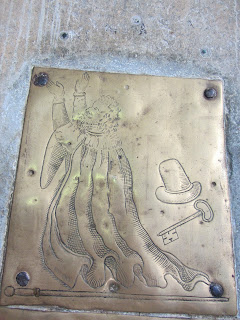My image comes from the church at Wing in Buckinghamshire. This church is famous for the Dormer tombs, which are indeed spectacular. But the gentry commemorated themselves in more or less every parish church: this wall brass commemorates Thomas Cotes, whose life was spent as porter at the nearby Ascott House: ‘Set up at the apoyntment and charges of his frend Geo Houghton’. He died on November 20th, 1648.
Cotes is
depicted at the moment of leaving his life-long office behind: he extends his
hands towards heaven, and we can imagine that he is seeing the divine light.
Falling from him are the markers of his purely temporal role: his beaver hat
(which gave him status and warmth), the great key to Ascott Hall, and his
staff. At Spenser’s Bower of Bliss, the false genius as porter holds a staff
‘in hand for more formalitee’. But that’s at a place without any proper
restraints; it’s always a bad sign in Spenser if simply anyone can get past the
porter, as is the case with ‘Malvenu’, the porter at the House of Pride ‘who
entrance none denied’. A proper porter’s duties obviously involved regulating
entry into the house, but he would also have been in charge of throwing people
out – the drunk, the unruly, anyone who had been or threatened to be offensive
– so the porter’s staff is sturdy and long, a super-truncheon. There is a faint
piquancy about an image of a man who regulated entry depicted at the instant of
admission into the most exclusive premises of all.
I will
transcribe the verses:
Honest old
Thomas Cotes, that sometime was
Porter at
Ascott=Hall, hath now (alas)
Left his key,
lodg, fyre, friends and all to have
A roome in
heaven, This is that good mans grave
Reader,
prepare for thine, for none can tell
But that
you two may meete to night, Farewell.
Two further
possible nuances strike me: is there perhaps a suggestion that Cotes, so
excellent a porter, might simply slip into his old role in his new heavenly
mansion? The reader is enjoined to think that their end might come suddenly,
and that they might meet Cotes in charge of ingress at the gate of heaven.
And the
whole plaque says, in a different sense, what Cotes may well have spent his life saying: ‘I pray you,
remember the porter’.
I sought
another early modern text about porters (this little project rapidly turning
into another unwritten monograph, ‘The Porter in early modern society and
literature’), and soon found Ianitor
animae: the soules porter to cast out sinne, and to keepe out
sinne. A treatise of the feare of God. Written by William Price, Batchelour of
Divinitie, and vicar of Brigstocke in Northamptonshire (1638).
This little
treatise took its inspiration from St Bernard: “The feare of God is the porter
of the soul, that casts out sinne, and keepeth out sinne, so Bernard”, with a
side note: Ianitor animae, Bern. Thomas Watson liked the same figure: “St
Bernard calls Holy Fear Ianitor Animae, The Door-keeper of the soul’. Spenser
does not directly allegorise the Porter at the House of Temperance in the Faerie Queene II ix, who has an alarm
bell. He is of course the tongue, with his rows of warders as his assistants
the teeth, but there may be a sense that this well-regulated tongue that
excludes ‘utterers of secrets’, ‘babblers of folly’ and ‘blazers of crime’ may
in part be ‘the fear of God’, Janitor Animae.
William
Price’s treatise about the fear of God is a typical early 17th
century performance, with masses of carefully made distinctions strenuously
fighting against the essential repetitiousness of the theme. I was pleased to
see an early version of the academic gambit that says piteously that ‘hardly
anyone has written about this topic’: “though many have brief essays, yet few,
or none, have done this Royal Grace the honour, or right to allot unto it a
Compleat full treatise”.
Price wrote
in a carefully sustained plain style: “Wherein I have studied plainness to
leave the lowest capacities without excuse”, and some of the most expressive
parts of his work come when he uses a simple analogy: a Christian between flesh
and spirit “is like a peece of iron between two lode-stones”. A good person may
be shaken by a sudden terror, but should recover: Price uses the analogies of
oil gradually separating out if it has been shaken with water, and then the
needle of a shaken compass settling back on its north. The Soul standing on
Grace, Love, Joy and Hope is like “a four square stone, whichever way soever
you cast it, it falls upright”.
Only rarely
does he forget simplicity: the poor Christian might “oscitantly demeane
himself”: from the Latin for yawning, and this adverbial use is narrowly an OED
antedating over a line cited from Henry More: “Which those drowsie
Nodders over the Letter of the Scripture have very oscitantly collected.” A
delightful word, expressive of a very 17th century disapprobation
(“was not Ruffinus, as learned men observe, a very careless and
oscitant Historian?” – from a EEBO keyword search).
Price dedicated his work to a later William Cecil. Whoever
introduced Nathaniel Tucker’s Theophosoi [as EEBO adds – ‘sic’] theophiloi: God's fearers are God's
favourites, or, An encouragement to fear God in the worst times delivered in
several sermons in 1662 had clearly looked at it, but Tucker himself seems
free of plagiary.
Back in Price (to
conclude), isn’t “the filiall feare of oGd” (as the heading for Chapter 7) one of the better 17th
century misprints - and not even corrected in the corrections? The type-setter must
have been ‘oscitant’.


No comments:
Post a Comment